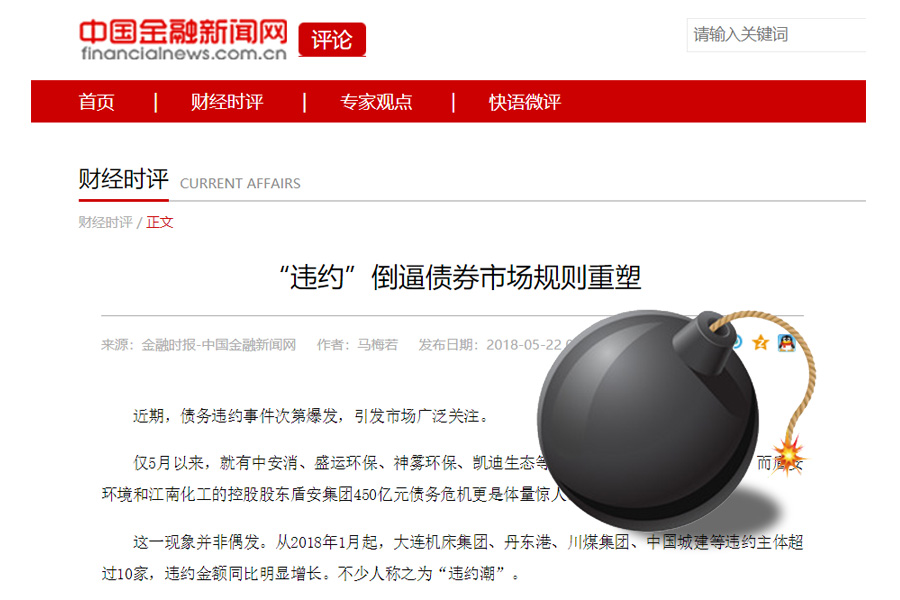◎ An article in Financial News suggests that China’s debt problem is very severe.
China’s Financial News published an article on May 22 titled, “‘Breach of Contract’ Force Reshaping of Bond Market Rules,” that commented on the recent cover-up of contract breaches in China. The article noted that “breaching contracts has become a trend in China’s bond markets,” and that the phenomenon is a “mandatory lesson” for businesses in China as it meets external competition with the opening up of the financial sector to foreign companies.
Financial News was co-founded by the People’s Bank of China, the Industrial and Commercial Bank of China, the Agricultural Bank of China, the Bank of China, the China Construction Bank, the People’s Insurance Company of China, the Bank of Communications, and CITIC Industrial Bank. It is the first shareholding media company to be established after reform and opening up in China.
The backdrop:
Since the start of 2018, at least 17 companies (10 listed companies) have been found to have breached contracts involving 14.564 billion yuan ($2.279 billion).
Since May, many trading institutions have been dumping property bonds. The prices of bonds from two well-known Chinese companies, LongFor and Oceanwide, have fallen sharply.
On May 2, Zhejiang Dun’an Group, one of the top 500 enterprises in China, was found to be involved in a debt crisis of 45 billion yuan. The company requested aid from the central government and held a debt coordination meeting with government officials.
On the evening of May 21, Shanghai Huaxin International Group Co. Ltd. issued an announcement via the Shanghai Clearing House that it was unable to pay the principal and interest for ultra-short-term financing bonds issued in Q2 2017. The bonds are worth 2.089 billion yuan.
On May 21, the listed company Beijing Orient Landscape Co. Ltd. (market value: 44 billion yuan) announced that buyers subscribed to only 50 million yuan of new bonds worth 1 billion yuan that the company was planning to issue. The Beijing Orient Landscape was planning to use 500 million yuan of its new bond issuance to repay the company’s ultra-short-term financing bonds which expire on May 22. In other words, the company’s plan to use new money to settle old debts is in jeopardy.
Our take:
The Financial News article indicates that China’s debt problem is indeed very severe. Chinese companies are increasing breaching contracts because the model of using new money to repay old debts has been disrupted under the current climate of deleveraging, liquidity contraction, and high debt ratios.
The article’s observation that “breaching contracts has become a trend in China’s bond markets” and how it is a “mandatory lesson” on China’s path to opening up is typical Chinese Communist Party (CCP) counterintuitive “War is Peace”-type rhetoric that aims to downplay tragedies and save face. For instance, when many people died because of shoddily constructed apartments during the 2008 Sichuan earthquake, the CCP claimed that “calamity prompts renewal and awakens a nation.” Likewise when ZTE has hit with crippling U.S. sanctions, the CCP repackaged the disaster as an opportunity that “forces Chinese technology to strengthen itself.”
Based on our research and understanding of CCP propaganda, SinoInsider believes that the Chinese authorities are signaling with the Financial News article that China’s debt problem is very severe and could even be beyond control.













